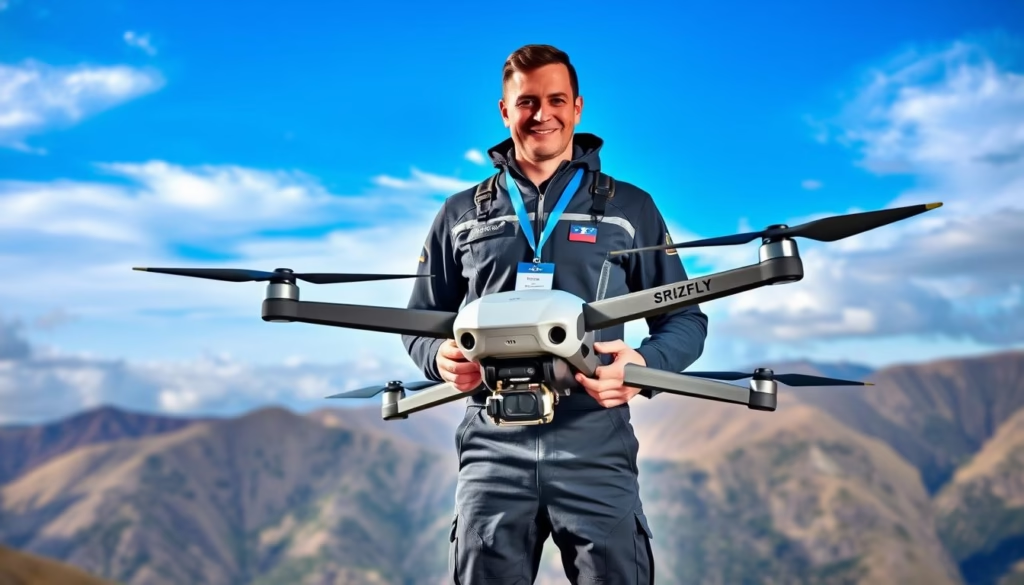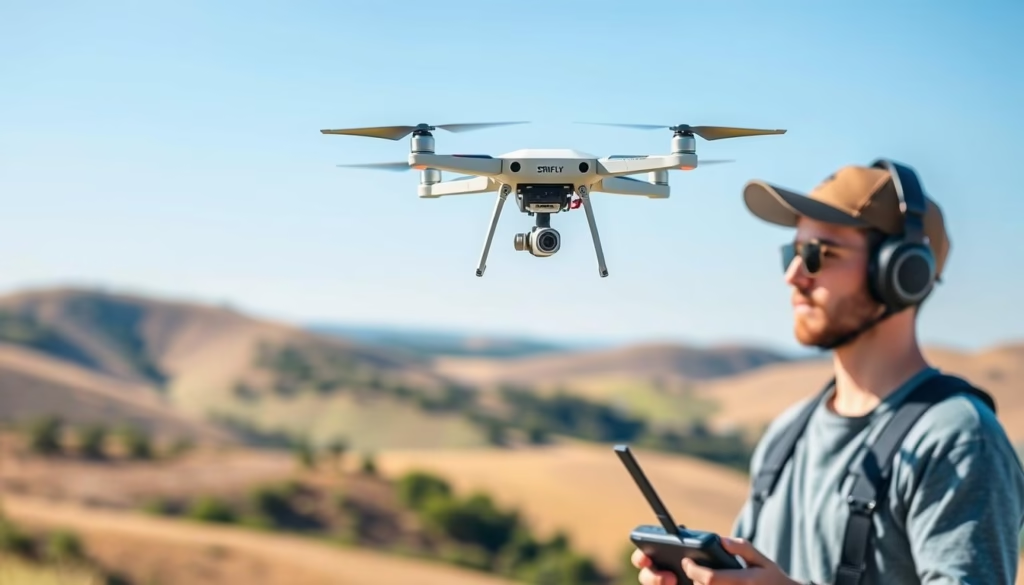What does it take to become a professional drone pilot, and how can one navigate the process of obtaining a drone pilot certification?
To fly commercially, a drone operator in the U.S. needs the FAA-issued Part 107 Certificate, which requires passing an Aeronautical Knowledge Test. The cost of obtaining a Part 107 license includes a testing fee of $175 paid at an FAA-authorized testing center. Drone pilot training is essential for those who want to become professional drone pilots, and it includes learning about FAA regulations, weather, and emergency procedures.
With the increasing demand for drone services, the career opportunities for professional drone pilots are expanding, and the potential for drone pilots to earn hundreds of thousands of dollars per year by taking on multiple projects is significant. The process to become an FAA certified drone pilot is less time-consuming and rigorous compared to becoming a manned aircraft pilot, and the annual salary of drone pilots listed as $95,000 on Glassdoor, with rates between $120 and $500 per hour for the highest earners according to DroneU.
Key Takeaways
- To become a professional drone pilot, one needs to obtain a drone pilot certification, such as the FAA-issued Part 107 Certificate.
- Drone pilot training is essential for those who want to become professional drone pilots, and it includes learning about FAA regulations, weather, and emergency procedures.
- The cost of obtaining a Part 107 license includes a testing fee of $175 paid at an FAA-authorized testing center.
- The potential for drone pilots to earn hundreds of thousands of dollars per year by taking on multiple projects is significant.
- The process to become an FAA certified drone pilot is less time-consuming and rigorous compared to becoming a manned aircraft pilot.
- The annual salary of drone pilots listed as $95,000 on Glassdoor, with rates between $120 and $500 per hour for the highest earners according to DroneU.
- Become a professional drone pilot requires a combination of technical skills, knowledge of regulations, and hands-on experience, and drone pilot training is a crucial step in this process.
Understanding the Drone Industry Landscape
The drone industry is rapidly evolving, with new technologies and applications emerging every day. As a result, drone pilot career opportunities are expanding, and the demand for skilled commercial drone pilots is on the rise. To succeed in this field, it’s essential to understand the current landscape and future opportunities.
According to recent data, the global drone market is projected to reach $54.6 billion by 2030, indicating significant growth opportunities within the industry. The construction industry, in particular, is expected to exhibit a compound annual growth rate (CAGR) of 23.4%, with a market value expected to reach US$ 9376 million by 2033. This growth is driven by the increasing use of drones in construction projects, which can help reduce costs and improve efficiency.
- Construction
- Agriculture
- Real estate
- Film production
As the industry continues to grow, the demand for skilled drone pilots will increase. Drone flight school programs can provide the necessary training and certification for those looking to pursue a career in this field. With the right skills and knowledge, drone pilots can take advantage of the many opportunities available in the industry.
Overall, the drone industry offers a wide range of career opportunities for those with the right skills and training. Whether you’re interested in construction, agriculture, or another field, there are many ways to get involved and succeed as a commercial drone pilot.
Essential Skills for Drone Pilots
Drone pilots require a combination of technical, navigational, and communication skills to operate safely and effectively. Technical proficiency with drones is crucial, as well as understanding weather conditions and emergency procedures. The demand for certified drone pilots, such as those with an FAA drone license, is increasing, and employers are seeking professional UAV operators with additional qualities beyond certification.
To become a successful drone pilot, one must undergo comprehensive drone pilot training, which covers various aspects of drone operations, including technical knowledge, safety protocols, and regulatory compliance. This training is essential for acquiring the necessary skills to operate drones safely and effectively.
Technical Proficiency with Drones
This includes understanding drone technology, components, and systems. A professional UAV operator must be able to assemble, maintain, and repair drones, as well as troubleshoot issues that may arise during operations.
Navigational and Safety Skills
Drone pilots must have excellent navigational skills to operate drones safely and avoid accidents. They must also be aware of safety protocols and emergency procedures, such as dealing with system failures or lost links.
Communication and Teamwork
Effective communication and teamwork skills are vital for drone pilots, as they often work in teams and need to communicate with other pilots, stakeholders, and authorities. They must be able to clearly convey their intentions, plans, and any issues that may arise during operations.
Educational Pathways to Certification
Drone pilot certification is a crucial step for individuals seeking to become professional drone pilots. Various educational pathways are available, including online courses and in-person training at a drone flight school. These programs provide students with the necessary skills and knowledge to obtain a drone pilot certification, which is essential for operating drones in a professional setting.
Some of the courses required for the Unmanned Systems Career Studies Certificate include UMS 107, UMS 111, UMS 177, and UMS 211. Additionally, elective courses such as UMS 295, GIS 200, and GIS 201 are available to choose from. The UMS Career Studies Certificate can be completed in two semesters, and various scholarship opportunities are available for students pursuing this field.
To become a certified drone pilot, individuals must obtain a Remote Pilot Certificate from the FAA by passing the FAA 107 exam. This exam must be proctored and facilitated at FAA-approved testing centers. With the drone industry expected to have a 51.1% growth rate in the next five years, certified drone pilots with advanced drone pilot skills are in high demand across various industries, including agriculture, wildlife preservation, and disaster mitigation.

- Agriculture and environmental stewardship
- Emergency response and law enforcement
- Real estate and construction
- Film making and photography
By choosing the right educational pathway and obtaining a drone pilot certification, individuals can acquire the necessary advanced drone pilot skills to succeed in this rapidly growing industry.
FAA Regulations and Compliance
For a professional UAV operator, understanding and complying with FAA regulations is crucial. The FAA drone license, also known as the Part 107 certification, is essential for drone pilots who want to operate commercially. To obtain this certification, one must undergo drone pilot training and pass the FAA knowledge test, which consists of 60 multiple-choice questions that must be completed within a 2-hour time frame.
A key aspect of FAA regulations is the requirement for drones to weigh less than 55 pounds and to be flown at or below 400 feet above ground level. Additionally, drone pilots must be at least 16 years old and must register their drone with the FAA. The cost of registration is $5 and is valid for 3 years.
Some key requirements for drone pilots include:
- Learning the rules and regulations
- Becoming an FAA-Certified Drone Pilot by passing the Knowledge Test
- Registering their drone with the FAA
It is also important for drone pilots to stay updated with the latest regulations and guidelines, as non-compliance can result in serious consequences, including fines and penalties.
| Regulation | Description |
|---|---|
| Part 107 | Rules for commercial drone operations |
| Remote ID | Requirement for drones to broadcast their identity and location |
| Operations Over People | Rules for flying over people and moving vehicles |
The Importance of Hands-On Experience
Drone pilot training is not just about theoretical knowledge, but also about gaining practical experience. Advanced drone pilot skills can only be developed through hands-on flying sessions. Commercial drone pilots require a significant amount of flight time to become proficient in various flight maneuvers.
According to the FAA, hands-on experience is essential for drone pilots to develop their skills and gain confidence. Flight hours and real-world training provide valuable experience and exposure to different scenarios and environments. Simulated flight scenarios and internships also provide opportunities for drone pilots to gain experience and develop their skills in a safe and controlled environment.
Some key aspects of hands-on drone pilot training include:
- Understanding different intelligent flight modes and manual flying
- Operating drone apps and performing takeoffs and landings
- Maintaining and calibrating drones, as well as camera operation and routine flight maneuvers
Recurrent training sessions are recommended to maintain proficiency in operating drones safely. Understanding the systems that make a drone work is crucial for safe drone operation. By gaining hands-on experience, drone pilots can develop the skills and confidence needed to succeed in the industry.
| Training Type | Cost | Duration |
|---|---|---|
| Basic Hands-On Drone Flight Training | $300 | 2 hours |
| Group Session | $200 per person | 2-3 hours |
| DJI Academy UAS Pilot Training Level 1 Certification | $1449 | Varies |
Building a Portfolio as a Drone Pilot
A professional UAV operator understands the importance of building a portfolio to showcase their skills and experience. This is especially crucial in the drone industry, where drone pilot career opportunities are abundant, but competition is fierce. A well-structured portfolio can help a drone pilot stand out and demonstrate their capabilities to potential clients and employers.
A drone flight school can provide the necessary training and education to become a skilled drone pilot, but it is up to the individual to create a portfolio that highlights their achievements. This can include documenting flight experience, showcasing best work, and networking with other professionals in the industry. By doing so, a drone pilot can increase their chances of success and take advantage of the many drone pilot career opportunities available.
Some key elements to include in a drone pilot portfolio are:
- Aerial photography and videography samples
- Client testimonials and case studies
- Equipment listings and technical specifications
- Software proficiency and certifications

By creating a comprehensive and well-organized portfolio, a professional UAV operator can demonstrate their expertise and increase their chances of success in the drone industry. Whether you are a recent graduate of a drone flight school or an experienced drone pilot, a strong portfolio is essential for taking advantage of the many drone pilot career opportunities available.
| Portfolio Element | Importance |
|---|---|
| Aerial Photography | High |
| Videography | High |
| Client Testimonials | Medium |
| Equipment Listings | Low |
Finding Employment as a Drone Pilot
Drone pilot career opportunities are expanding rapidly, with industries like real estate, infrastructure, and media & entertainment showing significant demand for drone services. As a commercial drone pilot, having the right skills and training is crucial to succeed in this field. Drone pilot training programs can provide the necessary knowledge and experience to pursue a career in this industry.
According to PwC, over 628,000 people will be employed in the ‘drone economy’ by 2030 in the UK. This growth is driven by the increasing adoption of drones in various industries. To take advantage of these opportunities, drone pilots can utilize job boards and online resources, such as The Droning Company, to search for job openings and connect with potential employers.
Some key ways to find employment as a drone pilot include:
- Utilizing job boards and online resources
- Approaching potential employers directly
- Freelancing and contract work
By leveraging these strategies and having the right training and skills, drone pilots can capitalize on the growing demand for their services and build a successful career in this exciting and rapidly evolving field.
Continuous Learning and Development
As a professional UAV operator, it is essential to engage in continuous learning and development to stay updated with the latest technologies and trends in the drone industry. This can be achieved through advanced drone pilot training programs, which provide individuals with the necessary skills to operate unmanned aerial vehicles effectively in various applications.
Advanced drone pilot skills can be acquired through specialized courses, such as those focusing on aerial photography, surveying, or inspection. These courses equip drone pilots with the knowledge and expertise required to excel in their field and provide high-quality services to clients. By pursuing advanced certifications, drone pilots can demonstrate their commitment to professional development and enhance their career prospects.
Some key areas of focus for continuous learning and development include:
- Staying updated with the latest FAA regulations and guidelines
- Mastering new technologies and innovations in the drone industry
- Developing advanced skills in areas such as aerial photography or surveying
By investing in continuous learning and development, professional UAV operators can stay ahead of the curve and provide exceptional services to their clients. This not only enhances their reputation but also contributes to the growth and development of the drone industry as a whole.
| Training Program | Duration | Cost |
|---|---|---|
| Basic Drone Pilot Training | 2 weeks | $1,000 |
| Advanced Drone Pilot Training | 4 weeks | $2,500 |
| Specialized Drone Pilot Training | 6 weeks | $4,000 |
Launching Your Own Drone Business
For drone pilots seeking greater autonomy and financial opportunities, starting a drone services company can be a rewarding path. The drone industry’s rapid growth has created a wealth of commercial drone pilot career opportunities, with commercial drone pilots earning an average of $50,000 to $100,000 annually. Those in specialized fields like aerial mapping, cinematography, and industrial inspections can earn even higher rates, charging $150 per hour or more.
Launching a successful drone business requires a combination of technical expertise, regulatory compliance, and strategic planning. Aspiring drone entrepreneurs must navigate the legal and insurance requirements, develop effective marketing strategies, and build a strong client base. With the right approach, drone pilots can turn their passion into a thriving enterprise, offering services such as real estate photography, agricultural surveying, and construction inspections.
Comprehensive training programs like those offered by DARTdrones provide the knowledge and hands-on experience needed to launch a drone business. These programs cover everything from starting a company to advanced flight operations, equipping pilots with the skills and certifications required to stand out in the competitive drone market. By investing in their education and continuously developing their skills, drone pilots can position themselves for long-term success in this dynamic industry.
FAQ
What are the key requirements to become a professional drone pilot?
Becoming a professional drone pilot requires a combination of technical skills, knowledge of regulations, and hands-on experience. Proficiency with drone operation, navigational and safety skills, as well as communication and teamwork abilities are essential for drone pilots.
What are the current trends and future opportunities in the drone industry?
The drone industry is rapidly evolving, with new technologies and applications emerging constantly. Key industries utilizing drones include construction, agriculture, and film production, and the demand for drone services is expected to grow significantly in the coming years.
What are the essential skills required for drone pilots?
Drone pilots need a range of skills, including technical proficiency with drones, navigational and safety skills, as well as effective communication and teamwork abilities. These skills are crucial for safe and effective drone operations.
What are the different educational pathways to drone pilot certification?
There are various options for drone pilot certification, including online courses and in-person training. The choice of certification depends on the individual’s goals, career aspirations, and the type of drone operation they wish to perform.
What are the key FAA regulations and compliance requirements for drone pilots?
Understanding and complying with FAA regulations, such as Part 107 rules, is essential for drone pilots to operate safely and legally. Non-compliance can result in serious consequences, including fines and penalties.
Why is hands-on experience important for drone pilots?
Hands-on experience, including flight hours and real-world training, is crucial for drone pilots to develop their skills and gain confidence. Simulated flight scenarios and internships also provide valuable opportunities to build practical experience.
How can drone pilots build a professional portfolio?
Building a portfolio that documents flight experience and showcases best work can help drone pilots demonstrate their capabilities and attract potential clients and employers. Portfolios also provide networking opportunities to connect with other industry professionals.
What are the common methods for finding employment as a drone pilot?
Finding employment as a drone pilot may involve using job boards and online resources, approaching potential employers directly, and exploring freelancing or contract work opportunities to gain experience and build a professional network.
Why is continuous learning and development important for drone pilots?
Continuous learning and development, through advanced certifications, industry workshops, and staying updated with the latest technologies, are crucial for drone pilots to remain competitive and effective in their careers as the industry continues to evolve rapidly.
What are the key considerations for launching a drone business?
Starting a drone services company requires a deep understanding of the market, competition, and regulatory requirements. Effective marketing, navigating legal and insurance requirements, and continuous innovation are essential for the success of a drone business as the demand for drone services continues to grow.



